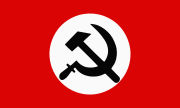
Back Nasionaal-Bolsjewistiese Party Afrikaans Нацыянал-бальшавісцкая партыя Byelorussian Нацыянал-бальшавіцкая партыя BE-X-OLD Национал-болшевишка партия Bulgarian Partit Nacional Bolxevic Catalan Nacionálně bolševická strana Ruska Czech Nationalbolschewistische Partei Russlands German Partido Nacional Bolchevique Spanish Natsionaalbolševistlik Partei Estonian Alderdi Nazional Boltxebikea Basque
National Bolshevik Party Национал-большевистская партия | |
|---|---|
| Abbreviation | NBP, Nazbols |
| Leader | Eduard Limonov |
| Founders | Eduard Limonov[1] Aleksandr Dugin[2] Egor Letov |
| Founded | 1 May 1993 |
| Legalised | 16 August 2005[3] |
| Banned | 7 August 2007[4] |
| Succeeded by | The Other Russia National Bolshevik Front[5] Eurasia Party |
| Headquarters | Bunker NBP, st. Maria Ulyanova, 17, building 1, Moscow, Russia[6] |
| Newspaper | Limonka |
| Membership | |
| Ideology | National Bolshevism Russian ultranationalism Neo-Sovietism Russian irredentism Anti-Western sentiment Left-wing nationalism Soviet patriotism Euroscepticism Anti-establishment |
| Political position | Syncretic[nb] |
| Coalition | National Salvation Front (1992–1993) The Other Russia (2006–2010) |
| Colours | Red White Black |
| Slogan | "Russia Is Everything, The Rest Is Nothing!" (motto) "Yes, Death!" (greeting)[7] |
| Anthem | "Anthem of the National Bolshevik Party",[8] by Dmitri Maximovich Shostakovich[9] |
| Party flag | |
 | |
| Website | |
| eng.nbp-info.ru | |
^ nb: Within the context of National Bolshevism, which is described as "a peculiar form of Marxist–Leninist etatism that fused the pursuit of communist ideals with more etatist ambitions reminiscent of tsarist 'Great Power' (velikoderzhavnye) traditions",[10] the party is seen as an attempt by Limonov and Dugin to try to unite left-wing and right-wing extremists on the same platform,[11] and as having used, in reference to one of the party's mobilizations, "a bizarre mixture of totalitarian and fascist symbols, geopolitical dogma, leftist ideas, and national-patriotic demagoguery."[12] | |
| Part of a series on |
| National Bolshevism |
|---|
 |
|
|
The National Bolshevik Party (NBP; Russian: Национал-большевистская партия, romanized: Natsional-bolshevistskaya partiya) operated from 1993 to 2007 as a Russian political party with a political program of National Bolshevism. The NBP became a prominent member of The Other Russia coalition of opposition parties.[13] Its members are known as Nazbols (Russian: нацболы).[14]
There have been smaller NBP groups in other countries. Its official publication, the newspaper Limonka, derived its name from the party leader's surname and from the idiomatic Russian word for a grenade. The main editor of Limonka was for many years, Aleksey Volynets. Russian courts banned the organization and it never officially registered as a political party. In 2010, its leader Eduard Limonov founded a new political party, called The Other Russia of E. V. Limonov.[15]
- ^ "BBC – Adam Curtis – THE YEARS OF STAGNATION AND THE POODLES OF POWER". 18 January 2012. Retrieved 4 August 2014.
- ^ "Нацбол.ру - Нацбол должен знать - Декларация о создании НБП". 21 September 2008. Archived from the original on 21 September 2008. Retrieved 2 September 2018.
- ^ "Верховный суд России отменил запрет Национал-большевистской партии". Радио Свобода. 15 January 2006. Retrieved 2 September 2018.
- ^ "Лимонов использует НБП незаконно. И вообще он не Лимонов". utro.ru. 12 July 2006.
- ^ "Другая Россия – информация, все новости". Перебежчик. Archived from the original on 20 April 2021. Retrieved 7 June 2019.
- ^ "Бункер НБП (Москва)". Archived from the original on 8 May 2012. Retrieved 2 September 2018.
- ^ Shenfield, Stephen (2016). Russian Fascism: Traditions, Tendencies and Movements. Routledge. p. 205. ISBN 9781315500041. Retrieved 23 July 2019.
- ^ "Дмитрий Шостакович - Гимн НБП". 15 December 2015 – via www.youtube.com.
- ^ "Пой, партия, пой!". www.b-port.com. Archived from the original on 25 January 2019. Retrieved 2 September 2018.
- ^ Borenstein, Eliot (2004). "Review of National Bolshevism: Stalinist Mass Culture and the Formation of Modern Russian National Identity, 1931-1956". The Slavic and East European Journal. 48 (3): 497–499. ISSN 0037-6752. JSTOR 3220080.
- ^ Rogatchevski, Andrei; Steinholt, Yngvar (21 October 2015). "Pussy Riot's Musical Precursors? The National Bolshevik Party Bands, 1994–2007". Popular Music and Society. 39 (4): 448–464. doi:10.1080/03007766.2015.1088287. S2CID 192339798.
- ^ Yasmann, Victor (29 April 2005). "Russia: National Bolsheviks, The Party Of 'Direct Action'". Radio Free Europe Radio Liberty. Retrieved 15 November 2018.
- ^ Stolyarova, Galina (6 March 2007) Thousands Take to City Streets for Protest. Sptimesrussia.com. Retrieved on 23 February 2014.
- ^ Russian Nationalism, Foreign Policy and Identity Debates in Putin's Russia: New Ideological Patterns after the Orange Revolution. Columbia University Press. 2014. p. 147. ISBN 9783838263250. Retrieved 19 December 2017.
- ^ Лимонов готов стать гламурным политиком. Ng.ru (12 July 2010). Retrieved on 23 February 2014.